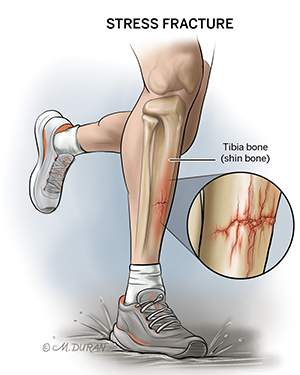About Fractures
A fracture is a broken bone that may be completely fractured or partially fractured in a number of ways and the severity of the fracture usually depends on the force that caused the break. Fractures may occur as a result of a direct blow to your bone or often as a result of overuse or increasing the amount or intensity of an activity too rapidly. With fractures, you will typically experience pain, swelling, bruising, and in some cases deformities where the limb may look out of place.

Common types of fractures include:
- Comminuted fracture - In this type of fracture, the bone shatters into three or more pieces.
- Oblique fracture - This type of fracture has an angled pattern.
- Open, compound fracture - The skin may be pierced by the bone or by a blow that breaks the skin at the time of the fracture. The bone may or may not be visible in the wound.
- Stable fracture - The broken ends of the bone line up and are barely out of place.
- Stress fracture - This type of fracture appears like tiny cracks in a bone. They’re caused by repetitive actions, such as jumping or running long distances, or through the normal use of a bone that is weak due to a condition like osteoporosis.
- Transverse fracture - This type of fracture has a horizontal fracture line.
Treating Fractures at UT Health Austin
To evaluate and verify the diagnosis of your fracture, your orthopedic specialist will likely take x-rays to determine the type of fracture and where it is located within the bone. Upon evaluation of your injury, your care team will then build a treatment plan specific to your condition and goals and work with you to understand the risk and benefits as well as what to expect throughout your recovery. Depending on the extent of your injury a cast or brace may be the best course of treatment or surgical intervention to place pins or screws may be required to stabilize and position the bones properly to heal. Fractures can take several weeks to several months to heal. During your recovery, muscle strength may deplete and the incorporation of physical therapy and strengthening exercises may be beneficial to help restore normal muscle strength, joint motion, and flexibility.
Care Team Approach
At UT Health Austin, we take a multidisciplinary approach to your care. This means you will benefit from the expertise of multiple specialists across a variety of disciplines caring for you in one place to avoid having to schedule multiple appointments with providers at locations all over the city. The Musculoskeletal Institute care team includes orthopedic surgeons, sports medicine physicians, physician assistants, physical therapists, physiatrists, chiropractors, nurse practitioners, dietitians, social workers, and more who work together to help you get back to the things in your life that matter most to you.
We collaborate with our colleagues at the Dell Medical School and The University of Texas at Austin to utilize the latest research, diagnostic, and treatment techniques, allowing us to customize a treatment plan specific to you. Treatment may include nonsurgical interventions, such as lifestyle modifications, physical therapy, or medication and injections, or surgery may be the best course of action to help improve your pain and function. Advanced imaging and lab testing are also available on-site if needed.
Learn More About Your Care Team

Musculoskeletal Institute
Health Transformation Building, 9th Floor
1601 Trinity Street, Bldg. A, Austin, Texas 78712
1-833-UT-CARES (1-833-882-2737)
Get Directions